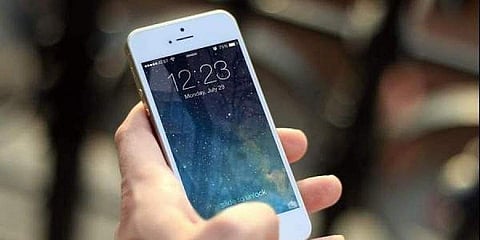
- LIFESTYLE
- FASHION
- FOOD
- ENTERTAINMENT
- EVENTS
- CULTURE
- VIDEOS
- WEB STORIES
- GALLERIES
- GADGETS
- CAR & BIKE
- SOCIETY
- TRAVEL
- NORTH EAST
- INDULGE CONNECT

Who could have thought that technology will change the way we think, live, and work beyond our imagination just in a span of a few decades? But now, everything is just a click away. It has made our life so much easier.
But technology becomes a problem when it begins interfering with our daily life, leading to addiction. Researchers have also found a link between excessive use of technology and mental health issues like depression and anxiety.
With hyper-connectivity and increasing dependence on technology, the stress level is also increasing and affecting our physical and emotional well-being. On a physical level, excessive use of computers, smartphones can lead to strained vision. Eye strain may also lead to neck, and shoulder pain.
Looking closely at a computer or mobile phone screen can also cause light sensitivity, dry eye, blurred vision, fatigue, and headache. Also, most computer users sit in an awkward position for a long time. Over time, this may lead to musculoskeletal issues. Those who are addicted to loud music and use headphones may suffer hearing loss.
Too much texting can also lead to muscle and joint pain. The longer you sit in front of a TV or computer, the greater likelihood of developing some heart problem. Too much use of smartphones, computers can also cause insomnia and sleep disorder. Extended use of these technologies promotes a more sedentary lifestyle that can cause obesity, diabetes, and cardiovascular disease.
On a mental level, the addictive use of digital technologies leads people towards emotional instability, attention deficit, depression, and anxiety. Teens need nine hours of sleep daily but the use of smartphones till late at night denies them the required sleep.
This results in a lack of focus. Smartphones and social media sites prevent them from experiencing solitude. As a result, they feel lonely and lost without their smartphones. Those who watch too much violence or porn suffer from a lack of empathy as they become accustomed to online violence.
Multitasking has become a new norm. While driving we talk on the phone, while watching TV we also check our smartphones. This is making us less efficient. Those who do multitask have more difficulty filtering out irrelevant information than those focusing on one task at a time. But the biggest problem we are facing today is our shortening attention span.
In 2000, our attention span was 12 seconds. But in 2015, it reduced to 8.25 seconds. Even goldfish that we keep in aquariums have a larger attention span. It can hold its focus for nine seconds. This is because technology has created infinite sources of distraction.
Our smartphones have become mini-computers that can do an endless number of things. People don't want to sit in silence any longer. But it has consequences. In short, we have less focus - too much multitasking - and not enough real connection.
We currently live in a culture that fosters attention-deficit disorder because of hyperconnectivity. This is also profoundly changing our memory patterns. Our reliance on the Internet has decreased our ability to easily retain facts. However, it seems that our ability to remember where and how to locate information Is improving.
As of now, there are 4.48 billion active social site media users. But are we more connected? Certainly, when the technological revolution was taking place, all the well-intentioned people believed that it would bring people and cultures together. Instead, it has made us more polarised than ever. We all are cocooned now.
We all live in our echo chambers where we only hear our voices. Human interaction is a casualty today. Our worth is not judged by not how many friends we have but by how many followers we have on Facebook, Insta, or Twitter.
This continuous distraction and lack of solitude or introspection create a very real problem and that is not knowing oneself. This creates anxiety and thus again reinforces the need for distraction and ultimately more stress.
Silence has become unbearable for our youth. They can't live with their thoughts and are continuously in search of distractions. In this age of technology, brooding and contemplating have taken the back seat.
Unfortunately, our society places too much value on intelligence and innovation. But being attentive is also equally, if not more, important. Inattentive people can't do anything worthwhile except routine jobs.
That's why all those innovators, be it Bill Gates or Mark Zuckerberg, meditate. It helps them stay focused. That’s why our sages always attached too much importance to focus and attentiveness. They had discovered the greatest simple secret for peace and bliss. Just sit down and watch your thoughts.
Once you become a witness or sakshi to your thoughts, you will find that they have begun to disappear and a strange calm is enveloping you. You will feel more focused and more attentive. And this should be your priority in the new year. Leave all your gadgets and tech for one hour daily and meditate.
(The author is the founder of Science Divine)